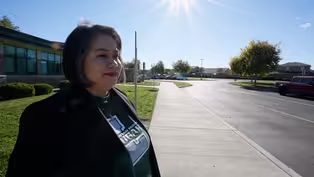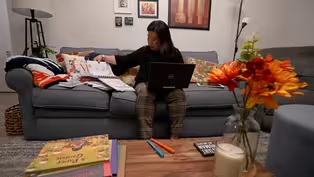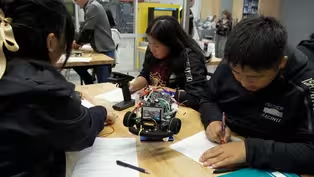Inside California Education
Ethnic Studies in the Classroom
Clip: Season 5 Episode 1 | 5m 37sVideo has Closed Captions
Learn about the new ethnic studies requirement for California high schools.
Learn about the new ethnic studies requirement for California high schools.
Problems playing video? | Closed Captioning Feedback
Problems playing video? | Closed Captioning Feedback
Inside California Education is a local public television program presented by KVIE
Funding for the Inside California Education series is made possible by the California Lottery, SchoolsFirst Federal Credit Union, Stuart Foundation, ScholarShare 529, and Foundation for the Los Angeles Community Colleges.
Inside California Education
Ethnic Studies in the Classroom
Clip: Season 5 Episode 1 | 5m 37sVideo has Closed Captions
Learn about the new ethnic studies requirement for California high schools.
Problems playing video? | Closed Captioning Feedback
How to Watch Inside California Education
Inside California Education is available to stream on pbs.org and the free PBS App, available on iPhone, Apple TV, Android TV, Android smartphones, Amazon Fire TV, Amazon Fire Tablet, Roku, Samsung Smart TV, and Vizio.
Providing Support for PBS.org
Learn Moreabout PBS online sponsorship♪♪ Christina: Today, we're going to go ahead and we're going to start talking about, um, and examining, uh, Native American mascots used within colleges, sports, high schools.
Okay... Annc: This is a typical discussion in one of several Ethnic Studies classes at El Rancho High School in Los Angeles County.
Christina: My course today is diversity in literature and film and basically we've been doing a unit on indigenous representation within the media.
And as part of that, what we're going to be looking at is the debate surrounding, um, native themed mascots.
Do you agree or disagree?
How do you feel about this?
Annc: Classes like this one will soon be a requirement in all California high schools.
It's part of a historic assembly bill passed in 2021, making California the first state in the nation to require that all graduating high school students take at least one course in ethnic studies.
On this campus, that's already been the rule for years.
Christina: We were actually the first in, uh, California to pass an ethnic studies resolution.
Annc: Christina Mata has been a teacher here since 2000.
It was 2014 when the El Rancho Unified School District passed a resolution requiring all their high schools to offer an ethnic studies class.
Mata helped the district create the vision that led to its current curriculum.
Christina: Most schools, um, and most people, when they think of ethnic studies, they think of it as a history course, but we knew right away that we wanted more than that.
Annc: Today, this high school offers not just one ethnic studies course, they have an entire cross-curricular department focused on it.
Christina: We have an ethnic studies literature course, we have ethnic studies literature and film course, we have a history course, um, a few history courses, actually.
We have ethnic studies art course and an ethnic studies mathematics course.
Annc: Dr. Deborah Duardo is the superintendent of schools for all of L.A. County, which includes 80 school districts.
She says ten of their districts have had ethnic studies courses in place for years.
Dr. Durado: Some of the things we've learned from those districts is that students do better, students thrive off of, you know, learning about different cultures, learning about, um, the history of this country in a way that sometimes they haven't been aware of.
Isiah: I think it's really cool because, like, we're able to talk about and discuss these ideas that we all have and, like, how we really feel about it.
Annc: Ethnic Studies is the interdisciplinary study of race, ethnicity and other identities, including both the struggles and contributions to our country from historically marginalized people.
They're stories that have often been left out of history books.
At El Rancho High School, the classes range from Chicano mural art to a math class called "I Am an Ethnic Statistic."
Yadira: I feel like it is important to have courses like these to, like, open our eyes to the diversity in the world and, like, know the rights and wrongs when it comes to different cultures and everything, and how to respect them.
Sarah: I think it's very important.
I think it promotes empathy.
I think it, um, dispels ignorance.
Dr. Durado: I think it says that in California we really care about inclusivity and making sure that all children have an opportunity to see themselves in the instructional program that they participate in.
Annc: Dr. Duardo says at a time when our country feels divisive, a statewide focus on helping students better understand each other and the many cultures that make up our history benefits us all.
Dr. Durado: I think it's going to bring us together and we're going to have a greater appreciation for living in a diverse city, a diverse country, and... and honoring that and celebrating it and seeing it as a strength.
Christina: She is against using, Native American mascots, right?
So what is your opinion?
Do you agree or disagree with her?
Annc: The state mandate requires all California high schools to teach ethnic studies before the 2025-26 school year.
By 2030, all graduates will have to have taken at least one class.
Meanwhile, the L.A. County Office of Education has created a toolkit with templates and case studies for districts to use.
Teachers like Christina Mata have traveled across the country speaking to school boards about the power of ethnic studies, and how it's changed their campus culture since they launched it almost a decade ago.
Christina: We know how it's working for our students.
So now to see that and how it's going to translate throughout the rest of California, um, and then hopefully the rest of the country, uh, that's very exciting because we know the power that it holds for these students.
Annc: The California State Board of Education has approved an ethnic studies model curriculum that provides guidance to high schools in developing their own ethnic studies classes.
The model curriculum provides background ideas and examples to begin local discussions on expanding ethnic studies offerings.
It contains dozens of sample lessons and topics including: Black Lives Matter and Social Change, An Introduction to African-American Innovators, Hmong Americans - Community, Struggle, Voice, Native American Mascots, U.S. Undocumented Immigrants from Mexico and Beyond: Mojada: A Madea in Los Angeles.
Day in the Life – School Counselor
Video has Closed Captions
Clip: S5 Ep1 | 3m 40s | See what a “day in the life” is like for a school counselor in the Central Valley. (3m 40s)
Video has Closed Captions
Clip: S5 Ep1 | 6m 3s | Tour a new affordable housing unit in the Bay Area built just for teachers. (6m 3s)
Hydrogen Fuel Cell Cars – Learning by Racing
Video has Closed Captions
Clip: S5 Ep1 | 4m 20s | Meet students in Elk Grove racing hydrogen fuel cell remote control cars. (4m 20s)
Providing Support for PBS.org
Learn Moreabout PBS online sponsorship
- News and Public Affairs

Top journalists deliver compelling original analysis of the hour's headlines.

- News and Public Affairs

FRONTLINE is investigative journalism that questions, explains and changes our world.












Support for PBS provided by:
Inside California Education is a local public television program presented by KVIE
Funding for the Inside California Education series is made possible by the California Lottery, SchoolsFirst Federal Credit Union, Stuart Foundation, ScholarShare 529, and Foundation for the Los Angeles Community Colleges.


